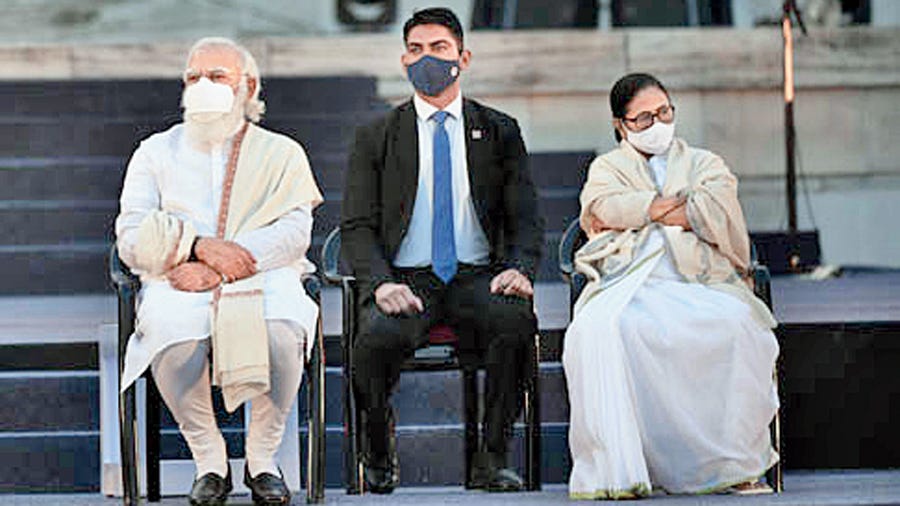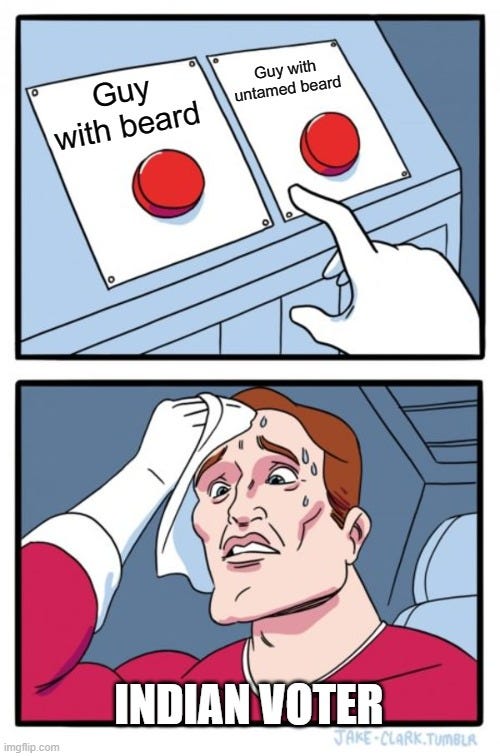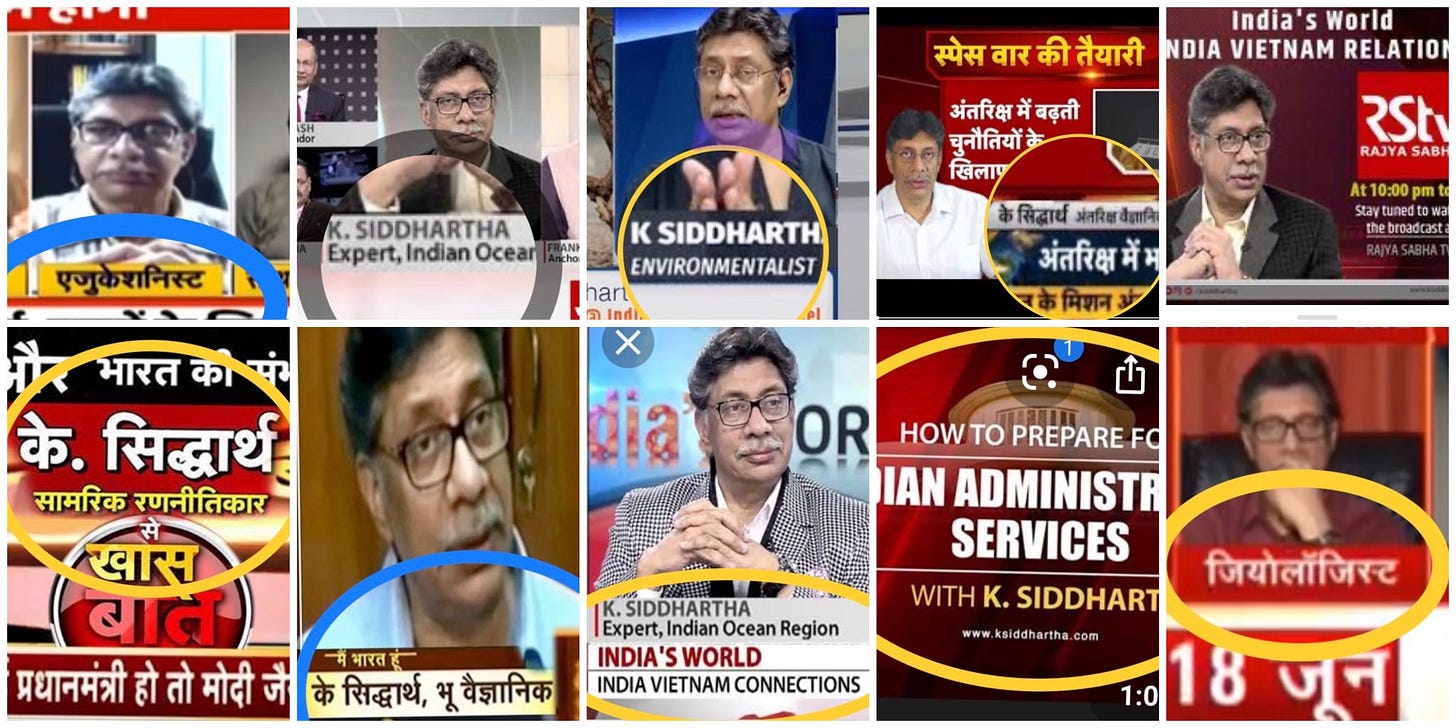Random Musing 20: Election Diary – Why I am tired of democracy
Freedom is what we do with what's been done to us. And something terrible was done to us for a thousand years by galouti kebab creators and opium sellers.
Nonsensical Nemo’s Note: The piece was supposed to be published much earlier but I just didn’t get time. Merry Christmas to all those who believe in the supremacy of a bearded deity.
“Freedom is what we do with what’s been done to us.” Most people understand this Jean-Paul Sartre quote to mean that we should rise above captivity and become more. On the other hand, I think it means that our concept of free will is delusional, and freedom is just our knee-jerk reaction to our inner demons.
For example, I used my newfound freedom after dropping out of engineering school to join a profession that has zero job stability, no modicum of a work-life balance, and an income that is chicken feed compared to my intellectual peers. Similarly, something terrible was obviously done to us during our 1000-year subjugation by galouti kebab creators and opium sellers, and we came up with the new-fangled version of freedom that we love to call democracy, highlighted by its worst manifestation: Elections.
The never-ending electoral season in India consists of meaningless pageantry of epic proportions with rules and budgets that no one follows and seems like it is set up to ensure that the biggest gangster wins. That the biggest gangster does win is a statement evidenced by the alacrity with which Lok Sabha MPs exercised their right to reply when met with an unruly intruder in their private sanctorum.
It’s a system is flawed on every level, from panchayat to Parliament, where the voters get an illusion of choice influenced by usually superficial reasons like oratory, ideology, bigotry towards a religious group, a politician’s FitBit step count, or their ability to grow a thick beard.
Now, I have learned to live in a democracy, but if there’s one day that I truly hate this bicameral panchayat-to-parliament never-ending electoral season system, it’s election result day.
For most online journalists, the day begins at 5 AM, and it’s the one day we envy our counterparts in the Global Times (Beijing, not the Chennai edition).
After all, Chinese journalists definitely don’t have to run 10,000 live blogs to inform readers – who don’t really give a damn – about who’s winning and who’s losing. It’s the Mr Jones paradox – informing people who don’t know about Mr Jones that Mr Jones is dead – on steroids.
Imagine trying to cajole a team of entertainment writers – who probably think Kiara Advani is LK Advani’s great grand-daughter – to update live numbers for a constituency in Telangana, where not only is every candidate called Reddy, but even the constituency has Reddy in its name.
If you think about it, since 2014, the election outcomes in India have become as predictable as the IPL: either the team led by the old guy, or someone backed by Ambani wins. 2014 altered the mental chemistry of some folks, who treat every single election – including their kids’ class monitor election – as a referendum of their personal fantasies. Now, you can usually find those “experts” wandering down Khan Market with a deranged look when they are not giving deranged takes to Karan Thapar.
Jokes apart, I am glad that all my torture takes place at the desk and doesn’t consist of what’s called ground reporting, especially when done by A-list TV anchors. Free from boring editorial constraints, ground reporting largely consists of going to a state for a day, channelling one’s inner K-Basu by talking to a cab driver, sampling the local street delicacies, and then predicting how people are going to vote.
Of course, every anchor has their own style. Some resort to the pugilist arts when cornered. Others prefer to set up their laptop on an upside-down bucket to pretend they are the only ones with a camera around.
It consists of thrusting the microphone into random people’s faces, which can sometimes lead to hilarious outcomes like the time a local reporter asked a young man his idea of a perfect party, and without skipping a beat, the young man replied: “Daru aur chicken hona chahiye.”
But the most annoying thing about elections is the thing that plagues Indian TV media the most: multiple-personality disorder. Indian media has discovered that there’s actually no need for actual experts, and their audience has no desire to actually learn something. That’s why you have the same guy giving gyan on everything.
They are particularly prolific during election season, vacillating from being an astrologer to a soothsayer to a psephologist.
The true stupidity begins once the votes have been cast. In Sir Humphrey’s sagacious words: “Politicians love to panic. They need activity; it’s their substitute for achievement.”
Journalists (and others involved in the dance of democracy) call this particular panic “exit polls”, a substitute for panic before we find out the results, which more often than not, have no relation to the actual result.
And then begins the post-hoc analysis once the final results are out. Or, as my friend Vivek Kaul likes to point out: “Everything is evident when the result is out.”
So once the elections are concluded, everyone is sure why someone won or lost, retrofitting their fantasies about life. What’s even worse is the commentary on social media after elections, a medium that allows us to broadcast our stupidity to the world so quickly that you wish there was a black hole around.
Here are some of the actual observations that have been proffered after the five-state election result:
BJP wins because Modi’s beard game is more consistent than Rahul Gandhi’s.
People who are educated, eat meat and don’t speak Hindi make more enlightened electoral choices.
Congress lost because Kamal Nath pushed the soft Hindutva card.
How is it feasible for Congress to lose even though it got more votes than the BJP in the four states?
All said and done, at the end of the day, the illusion of choice is pretty frustrating. It’s much easier, as Loki pointed out, to be ruled. If freedom is what we do with what’s been done to us, then perhaps the only way for us to be truly free is for that freedom to be taken away forever. I mean, Sisyphus had no choice other than to haul a big rock up a hill, and he was pretty happy about it.




